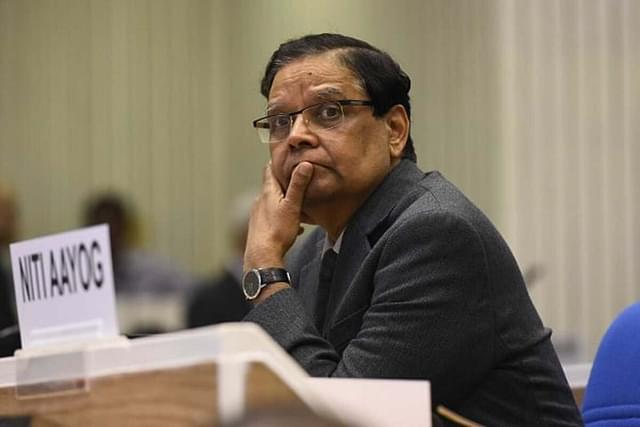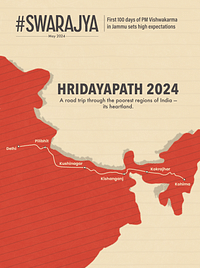Economy
'They Made Careers Out Of Sounding Alarm On Rising Inequality But Failed To Do Anything About It,' Arvind Panagariya On Inequality Labs Report
Swarajya Staff
Apr 03, 2024, 04:30 PM | Updated Apr 04, 2024, 12:37 PM IST
Save & read from anywhere!
Bookmark stories for easy access on any device or the Swarajya app.

In the realm of economics, few subjects provoke as much debate and scrutiny as inequality.
Following the release of a report by noted French economist Thomas Picketty and his associates which claims that economic inequality in India is at its peak, several Indian economists have been responding through their critical commentaries.
Among them, Arvind Panagariya, Chairman of the 16th Finance Commission, recently wrote a rebuttal, adding his perspective to the ongoing discussion.
In an article published in The Times of India on 2 March, Panagariya observed that inequality is at the same time — subjective as well as complex — and that the task of reducing poverty was more important for a developing country like India than evaluating whether the income of a large chunk of the population matches up with that of the ultra-rich.
Considering that the group of economists have led a greater emphasis only on the wealth of the top 1 per cent of India’s rich, Panagariya in his article has referred to them as "inequality alarmists who have made careers out of sounding the alarm about rising inequality but have rarely succeeded in doing anything about it".
Here are some of the interesting insights provided by the senior economist and Finance Commission Chairman Panagariya in the context of the inequality debate:
1) Inequality Versus Poverty
According to Panagariya, rising wealth of the rich and reduction in poverty — both are interrelated. The senior economist points out that wealth creation is essential for poverty reduction. Taking 1990 as the time marker, Panagariya observes that in the period before, the number of dollar billionaires was less compared to their increasing number post economic liberalisation in 1991.
“Today, billionaires are ubiquitous, but extreme poverty too is history,” he noted.
2) Complex Nature Of Inequality
The Gini coefficient serves as a common measure of inequality, indicating the concentration of income or wealth within a group.
To illustrate the complexity of inequality vis a vis poverty, Panagariya cites the example he would often give to his students which is a comparison between the Gini coefficients for the Indian states of Bihar and Kerala.
Since Bihar is considered to be a relatively poor state, it is assumed that the prevalence of inequality must be high there compared to Kerala, which has been governed by Left parties that believe socialism was key to reducing inequality.
The senior economist points out that contrary to this common impression, Kerala, with a high Gini coefficient exhibited high consumption inequality compared to Bihar, which despite being perceived as poorer displayed lower inequality.
According to the senior economist, this disparity between perception and reality underscores the complexity of inequality dynamics.
3) Not Top 1 Per Cent, Individual Context Matters
Contemporary discourse on inequality often centres on the rising share of the top 1 per cent in national income or wealth.
However, according to Panagariya, such forms of inequality may not evoke significant concern among the masses. In fact, the senior economist observes that lay masses may not be even aware of or interested in knowing what this inequality determinant actually means.
According to Panagariya, individuals are more affected by inequality within their immediate social circles than by the wealth accumulation of distant billionaires.
“A billionaire like Michael Bloomberg adding another billion to his wealth matters little to me since he is not a part of my immediate social circle; I am not in competition with him. But if a Columbia colleague is awarded a significantly larger salary increase than me, I am bound to rush to knock on the door of my school’s dean,” said Panagariya, who apart from heading the Finance Commission of India also teaches at the Columbia University in the US.
4) Heavy Taxes On Wealth Isn’t The Right Solution To Reducing Inequality
Picketty and other like-minded economists have recommended increased taxation on the wealth of the ultra-rich to reduce inequality. Panagariya on the other hand notes that this solution can be potentially counter-productive.
According to Panagariya, when the ultra-rich class generates wealth, it only keeps a small part of it with themselves as disposable income. The larger chunk of it is utilised on high-return investments which aid their businesses and inter alia the country’s economy.
“If the same wealth ends up in the hands of the government, it is unlikely that it would be similarly invested. Equally, the fear of future wealth being taxed away will put brakes on new entrepreneurship and investments. This is especially true of first-generation entrepreneurs who want to see their next generation to escape the hardships they suffered,” the senior economist said.
Save & read from anywhere!
Bookmark stories for easy access on any device or the Swarajya app.
Support Swarajya's 50 Ground Reports Project & Sponsor A Story
Every general election Swarajya does a 50 ground reports project.
Aimed only at serious readers and those who appreciate the nuances of political undercurrents, the project provides a sense of India's electoral landscape. As you know, these reports are produced after considerable investment of travel, time and effort on the ground.
This time too we've kicked off the project in style and have covered over 30 constituencies already. If you're someone who appreciates such work and have enjoyed our coverage please consider sponsoring a ground report for just Rs 2999 to Rs 19,999 - it goes a long way in helping us produce more quality reportage.
You can also back this project by becoming a subscriber for as little as Rs 999 - so do click on this links and choose a plan that suits you and back us.
Click below to contribute.





